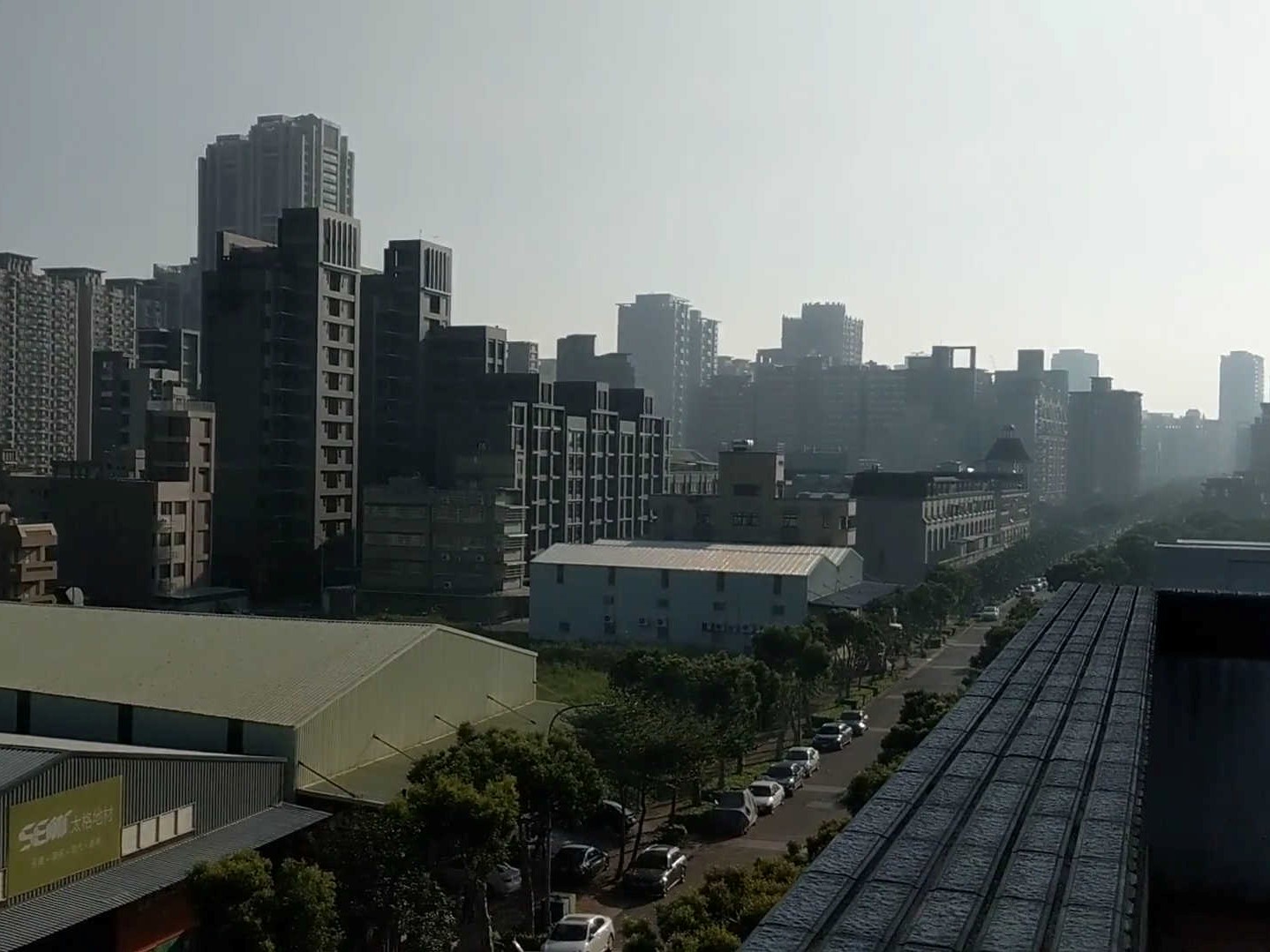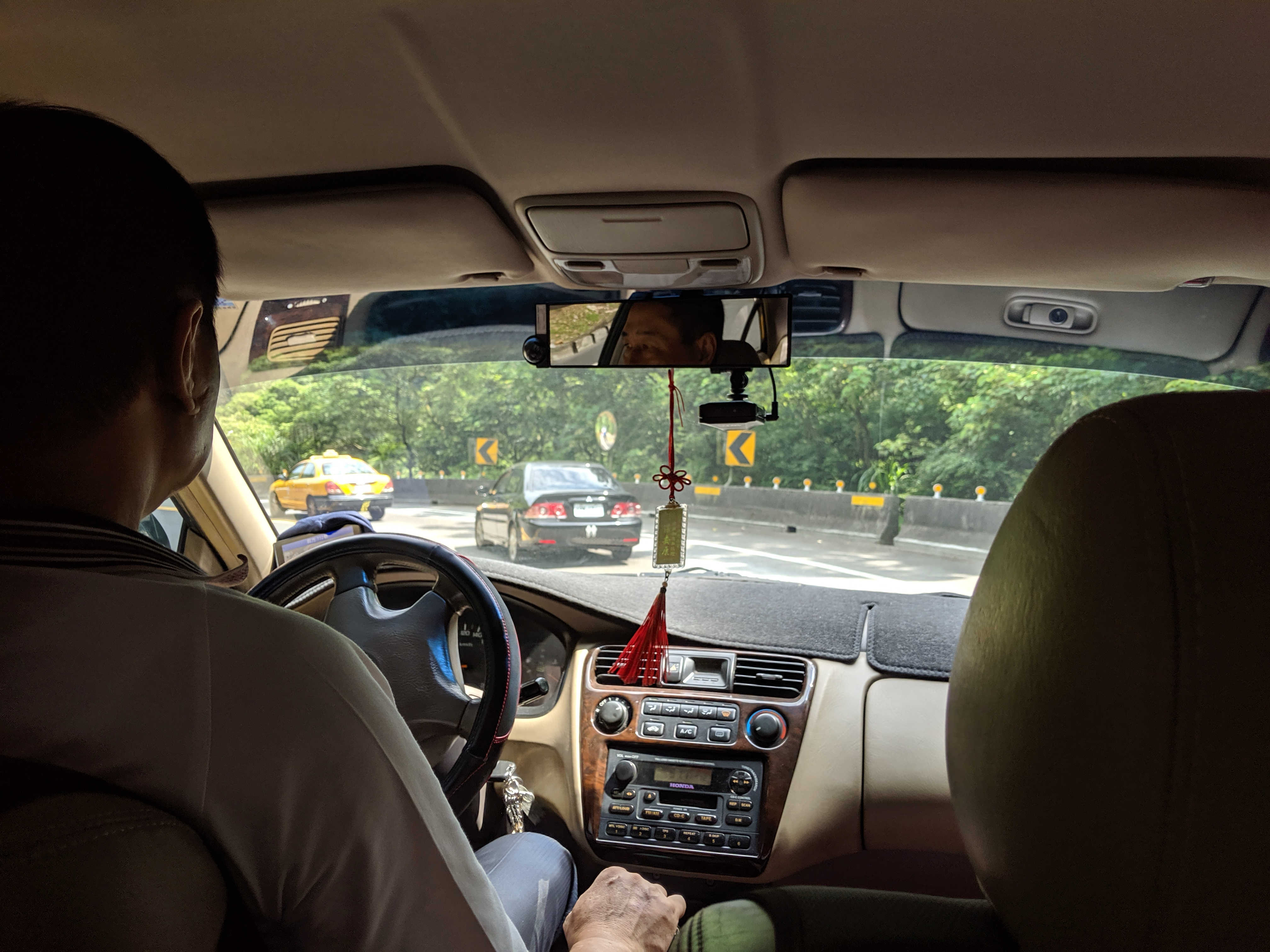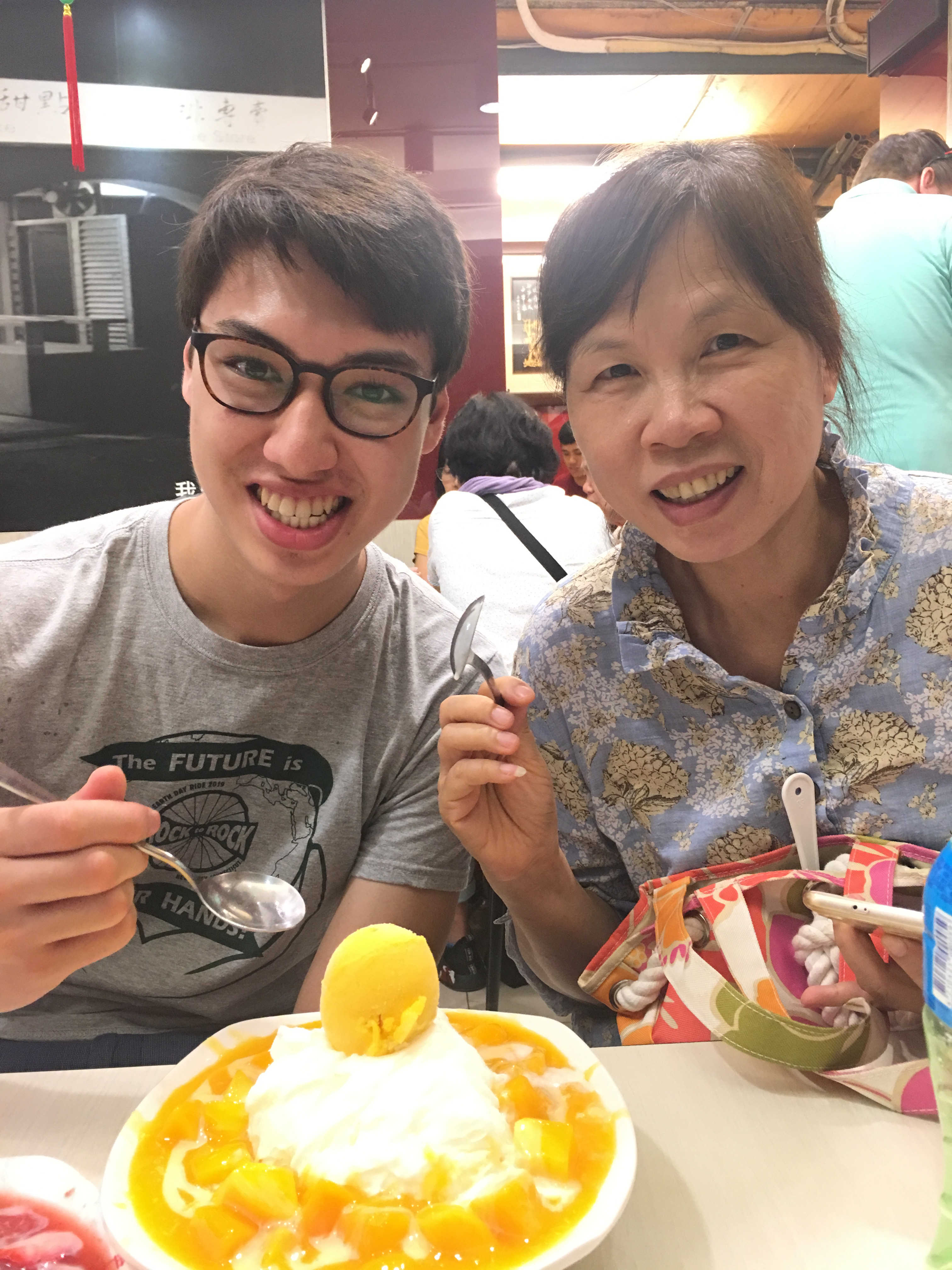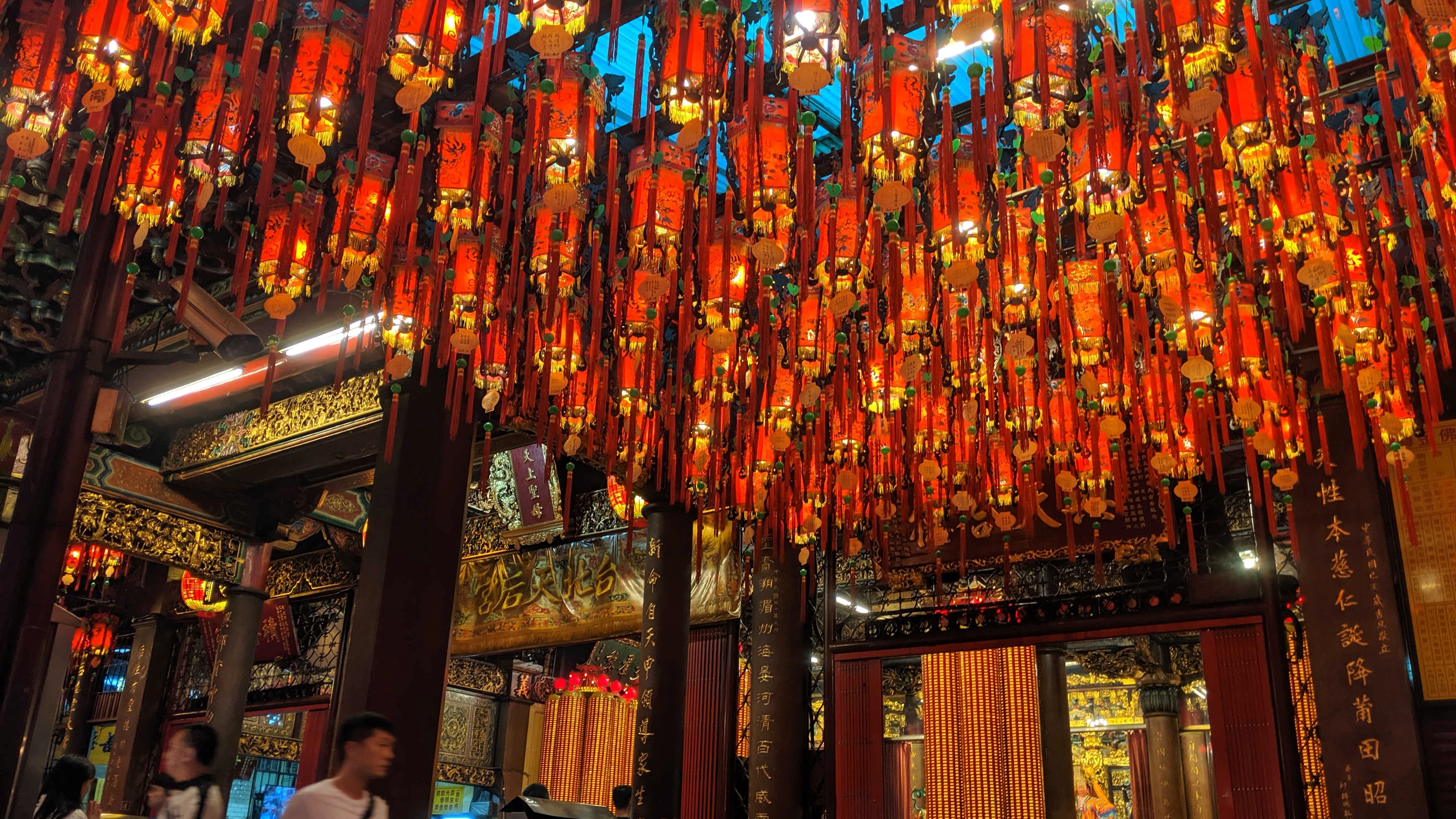I apologize for the delay in posting! This week has been extremely busy (and fun) so I haven’t had much time to sit down, mess around with the website, and write this one out. Also, this post took a lot of time and effort since I'm still struggling to articulate some thoughts I’ve had since arriving. This all might be a bit rough around the edges, so please bear with me.
Before leaving for Taiwan, my mom had arranged for some family to pick me up, which made me a little anxious. I was afraid to confront family on my own, since none of them speak English and I feel like I’ve only really met them once. It also doesn’t help that I’ve studied Chinese for less than a year and have little to no confidence in my speaking abilities. My mom told me that even my 大舅舅 (dà jiùjiu, eldest uncle), who is picking me up, is nervous too.
As I stumble off the plane at 4:30am, I can already feel Taiwan’s wet heat weighing me down. Aside from the other passengers on my flight, the airport is pretty much dead. Walking through the empty terminal, I try to decipher all the signs and advertisements that I pass by – no success. Each one makes me a little more frustrated and worried.
After collecting my belongings, I spot a dimly-lit 24-hour currency exchange stand and figure I should probably get some cash. There’s no line, and as I walk up to the counter the teller is looking at her phone, half-asleep. I croak a pitiful “你好” (nǐ hǎo) and she looks up at me, slightly annoyed. I silently hand her my cash and she asks me for my 護照 (hùzhào, passport), which I’m surprised I recognize. I sign some long form in Chinese (I had no idea what it was), take my cash, and leave.
Since I arrive at the main lobby early, I pull out my phone to message (in Chinese) my 大舅舅 that I’m here. Even though I know how to say it, I use Google translate anyway. Copy, paste, send.
A few moments later, my phone starts to ring. 大舅舅’s profile picture pops up on my screen, and my stomach drops. Texting in Chinese I can handle – if I don’t understand anything, I just use Google Translate, no problem. Talking? Real conversation? In Chinese class, I can barely decipher sentences spoken at half-speed after multiple listens. I stare at the screen and almost don’t pick up. Maybe I can pretend my phone was on silent and that I didn’t receive the call?
Eventually, I realize that it would be pretty (very) stupid to try to avoid the person who is picking me up, so I swallow my pride and answer the phone.
“餵 (wéi)? 餵? Matthew?”
Fuck, ummm, what do I say? Using my quick wits, I think back to my first semester Chinese textbook, Lesson 6, Dialogue 1: “Calling One’s Teacher.” I know exactly how to respond:
“餵? 餵?”
Nailed it.
At this point, I’m feeling pretty good about myself. But then, just as I thought I had come out on top, 大舅舅 struck me with swift blows of his lightning quick Chinese. I stood stunned, not comprehending a single word and unsure of how to respond.
But just as I was about to defeatedly utter the words “聽不懂” (tīng bù dǒng, “I don’t understand,” a phrase that I will become very familiar with), my aunt and my cousin burst through the airport doors and wave me over. I immediately hang up the phone and follow them. A close call.
However, my relief is short-lived. During the car ride, I understand very little of what any of my relatives are saying. My cousin and I try passing a translation app back and forth, but the translations are pretty rough and often don’t make sense. So after several failed attempts, my 大舅舅 tells them something along the lines of “He speaks some Chinese, you know. Just speak slowly.” To demonstrate, he clears his throat, looks at me in the rearview mirror, and asks “What would you like to eat for breakfast?” in what seems like slow-motion, wildly exaggerating his tones. Fumbling over my words, I respond “I would like some 鍋貼” (guōtiē, fried dumplings). So we stop at a breakfast stand, pick up some 鍋貼, and make our way back to his home in Linkou, a district just outside Taipei.

As we are eating breakfast in silence, the living room door opens and my 阿媽 (āmā, grandma) enters the room. “Ama!” I exclaim, mixing up my Chinese tones and making the classic mistake of calling my grandmother a horse (“a-ma,” my aunt corrects me). Like many other Taiwanese people of her generation, she only speaks Taiwanese, a language distinct from Mandarin. Unfortunately, this means that I close to zero chance of ever being able to directly communicate with her. She pulls up a chair next to me, and while we have no hope of talking with each other, I’m thankful I can even just be in her presence. She says something to my cousin, who nods and starts speaking into the translation app. He turns the screen to me: “Your grandmother is confident your Chinese will become very strong.” I turn to her and she smiles, and all I can say is 謝謝 (xièxie) – thank you.
Later that day, 大舅舅 took me to a mobile store to help me get a SIM card. As one of the workers helped us set everything up, we make small talk. At some point, I tell him I’m in Taiwan for the summer to study Chinese. “Why do you want to study Chinese?” he asks. I almost give my canned response of “Because I think Chinese is very interesting” – mostly to avoid getting into too much detail – but in that moment, it just felt too untrue. Using my limited vocabulary, I tell him “Because my family speaks Chinese.”
Big mistake. 大舅舅 makes a frustrated sigh, and then goes off on what seems like a mini-rant to the worker. I can’t understand most of what he’s saying, but I can pick out bits and pieces: “his mother and father both speak Chinese, but him and his brother do not!” Yet, even though he’s clearly upset, I can tell that his frustration isn’t directed at me. The worker listens and nods, and once 大舅舅 is finished he tells me in English “Well, it is good you can learn now.”
To be perfectly honest, I’m still not exactly sure why I don’t know Chinese. Was it my parent’s fault? I know they at least tried. I don’t remember if they spoke it in the house when I was little, but I do remember my mother ran her own weekend Chinese classes and I bawled my eyes out every time I had to go to one. She’d always drag me along, but for some reason I refused to learn anything. Eventually I stopped going. So then was it my fault? Was I just too stubborn? Why would I feel so strongly against it? I remember that throughout elementary and middle school, kids would occasionally pull the classic ching-chong pull-my-eyelids-apart dog-eater shit, but was that bad enough to make me feel ashamed of being Asian? Was it my hometown’s fault? Was it because I grew up surrounded by people that didn’t really look like me?
As far as I remember, I swung between either wanting to reject my heritage or simply just ignoring it. I think it wasn’t until about a year or two ago when I first truly embraced it and felt “Yeah, being Taiwanese is dope and I’m proud of it.”
So was I embarrassed and upset at 大舅舅 for going off like that? A bit. But I also think his feelings are pretty fair – I mean, I should know Chinese. I think I’d also be a little upset if I couldn’t communicate with my own nephew or grandson.

Afterwards, 大舅舅 drove me to my apartment. I should briefly clarify that despite the small outburst in the store, he is a kind person and has been super helpful throughout my arrival. I also want to mention that there are probably a lot of cultural differences at play here, so some family dynamics might work in a certain way that I don’t yet fully understand.
After settling into my apartment, I met up and walked around the area with my 阿姨 (āyí, aunt). Even though my attempts at conversation aren’t much more successful, I’m relieved and glad I can see her. She’s the sweetest woman ever and reminds me a lot of my own mom.
Sometime in the afternoon, we decided to duck into some cramped little restaurant for lunch. I couldn’t recognize any of the words on the menu, so she patiently helped me order and we took a seat. Even though the restaurant was bustling with students from a nearby college, we ate in silence with our heads bowed. At some point during the meal, my aunt almost instinctively gave me a slice of her pork and put it on my plate, insisting I should eat more. It was the exact same thing my mother would do at home. For some reason, right then, I looked up and almost started crying.
A massive wave of emotions hit me all at once. What took me so long to get here? How was I so stupid to choose to ignore this? All this person had ever shown me was care and love; why did it take me nineteen years just to accept it? I spent so long pushing these people and these ideas away, but now I was desperately trying to chase them back down. I wanted so badly to reconnect with it all. I had so many questions for my 阿姨, so many things that I didn’t know about her life and so many things that I wanted to share. I felt a burning in my chest and face as if my body was trying so hard to communicate but simply didn’t know how. I eat the slice of pork. “好吃,” (“tastes good”) I tell her, and she happily gives me more.
There have been a few moments like this that remind me why I study Chinese. No, it’s not purely out of shame or obligation or anything like that. It’s because not knowing this language is a barrier, one that hurt relationships with both my family and myself. Learning Chinese and being here in Taiwan is about embracing a side of me that I simply didn’t acknowledge while I was growing up.
Maybe this is all a little naïve. Maybe in the end, it doesn’t even matter that much and I’m just being melodramatic. And to whoever is reading this, I do apologize if this post feels cringey or annoying or overly-emotional (I very well might look back on it and feel the same way). Right now, though, I do feel like all of it matters. I hope that as the summer goes on, I can chase these people down, love them, and rebuild some bridges.

